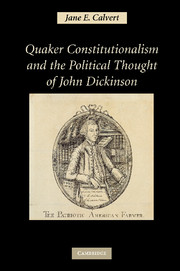Book contents
- Frontmatter
- Contents
- Acknowledgments
- Abbreviations
- Introduction
- I QUAKER CONSTITUTIONALISM IN THEORY AND PRACTICE, C. 1652–1763
- II THE POLITICAL QUAKERISM OF JOHN DICKINSON, 1763–1789
- 6 Turbulent but Pacific: “Dickinsonian Politics” in the American Revolution
- 7 “The Worthy Against the Licentious”: The Critical Period in Pennsylvania
- 8 “The Political Rock of Our Salvation”: The U.S. Constitution According to John Dickinson
- Epilogue: The Persistence of Quaker Constitutionalism, 1789–1963
- Bibliography
- Index
- References
Epilogue: The Persistence of Quaker Constitutionalism, 1789–1963
Published online by Cambridge University Press: 27 July 2009
- Frontmatter
- Contents
- Acknowledgments
- Abbreviations
- Introduction
- I QUAKER CONSTITUTIONALISM IN THEORY AND PRACTICE, C. 1652–1763
- II THE POLITICAL QUAKERISM OF JOHN DICKINSON, 1763–1789
- 6 Turbulent but Pacific: “Dickinsonian Politics” in the American Revolution
- 7 “The Worthy Against the Licentious”: The Critical Period in Pennsylvania
- 8 “The Political Rock of Our Salvation”: The U.S. Constitution According to John Dickinson
- Epilogue: The Persistence of Quaker Constitutionalism, 1789–1963
- Bibliography
- Index
- References
Summary
In undertaking a study of the origins of ideas and the influence of groups and individuals on movements and events, definitive evidence is often difficult to come by. Moreover, parallel strains of thought often arise from similar sources and develop independently from one another, allowing individuals moving in different circles to come to similar conclusions without knowledge of one another. Unless the historian finds solid evidence, such as well-used books in a personal library or that rare explicit statement bestowing credit, much of the influence must be deduced through the practical expression of a strain of thought and the ubiquity of the culture it created. It is clear, for example, that despite the absence of a succinctly articulated theory of civil disobedience in the early modern period, Quakers were the first practitioners of it. By the late-eighteenth century, this language and tradition was concrete enough that it could be recognized and explicitly referenced as an example, as Dickinson did during the Revolution.
To the extent American resistance to Britain remained peaceful, inspired by Quakerism, Dickinson became the first leader of a national peaceful protest movement, a position that would later be held by Gandhi and Martin Luther King, Jr. But because until now he has not been recognized as such, we cannot properly consider him the “founder” of this tradition of leadership. He was not their model; he was merely the first. Some might object that this designation is inaccurate because the cause he led ultimately resulted in war.
- Type
- Chapter
- Information
- Publisher: Cambridge University PressPrint publication year: 2008



